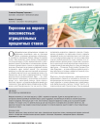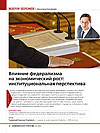Eurozone on the Verge of Widespread Negative Interest Rates
DOI: 10.33917/es-3.169.2020.50-54
The global economy, including the eurozone, experienced a shock in 2008. As one of the consequences, central banks of the largest economies in the world, in order to support economic activity, reduced interest rates on loans. Although 11 years have passed, in the eurozone lending rates still remain extremely low. This indicates that the monetary union has not yet recovered from the post-crisis state. In fact, more and more probable is becoming a recently inconceivable scenario that the eurozone for a long time will get into the era of negative interest rates.





